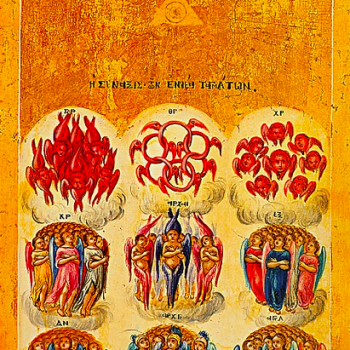Annuntiamus: We Proclaim
Tiring of trying
It’s a necessary dying
Like the horseshoe crab in its proper season to shed its shell
Such distance from our friends
Like a scratch across a lens
Made everything look wrong from anywhere we stood
—Aaron Weiss, “Messes of Men”
This weekend, I’ll be taking a very brief trip to San Jose. I’d appreciate prayers for this trip, both for myself and for the event I’m attending. Eve Tushnet has put together a group of people to try and hammer out better approaches to Catholic catechesis for LGBTQ teens than, ehh, what we currently have. She honored me with an invitation. I jumped at the chance: not only is it work that I deeply value for obvious reasons, it’s a chance to see the Pacific for the first time in more than ten years.
I forget when I last mentioned this, so even regular readers may not know it, but my whole family are from the west coast. Monterey was the first place I lived in the US (I was born abroad—Navy brat), and San Jose itself happens to be the city where my parents grew up. I miss it out there, and one of the things I miss most is actually the fogs; the ocean there is coming down from Alaska and ice-cold, so when the conditions are right to produce fog, it’s a rich, thick stuff that rolls inland like something from Faërie.
Besides this harmless ulterior motive, I am also a little worried about the meetup. Or rather, not so much the meetup, but my being there.
Quæsumus: We Beseech Thee
They caught me making eyes
At the other boatmen’s wives
And heard me laughing louder at the jokes told by their daughters
I’d set a course for land
But you well understand
It takes a steady hand to navigate adulterous waters
—Aaron Weiss, “Messes of Men”
As I admitted in my last, I’m not chaste, and haven’t been in a long time, and while that’s in some ways the least of my problems, it’s pretty pertinent here, dontchathink? If anything, I’m the poster boy for why Side B Catholicism is either bad theology or bad psychology. If you choose, I expect you can lead a morally upright, dignified, and maybe even reasonably happy life as a same-sex attracted Catholic: minding your own business, thinking of your orientation as a private disease, and not involving yourself in queer politics or culture. Equally, I know quite a number of Side A people who, while they dissent from Catholic teaching, are to all appearances a good deal more devout than myself, and most certainly more monogamous. Both of those seem more creditable than my life as a bad Graham Greene knockoff.
To be clear, I absolutely see the appeal of being a bad Graham Greene knockoff. What writer doesn’t? Reader, I was A Tortured Soul; please, please, ladies and gentlemen, the applause, don’t be silly; clap harder. But, well, a person who is, consciously, half-enjoying their blend of guilty melancholia and self-indulgent hypocrisy—is that really a guy you want on a project like this? Hopefully the answer is, somehow or other, yes, since I am going, for courtesy’s sake if nothing else; it’d be perfectly ghastly to stand Eve up at the eleventh hour. And if Judas served God’s purposes not only despite, but in, betraying him, then I guess I have a great rationalization for doing pretty much anything I felt like doing anyway.
Spiritus Rore Tui: Thy Spirit Like the Dewfall
I’ve long liked T. S. Eliot, but I usually like him a lot more than I understand him. (This is partly because he’s given to obscurity, but also partly because I can hardly be assed to apply the humanities education my parents toiled for and, say, diagram a sentence; shouldn’t my valet be doing that?) Four Quartets, a late collection of Eliot’s in which “The Dry Salvages” appears, is famous for being hard to follow; and “The Dry Salvages” is neither my favorite in the book nor the one I’ve spent the most time on.1 But something moved me to pull it down from the shelf this morning and page through it.
… under the oppression of the silent fog
The tolling bell
Measures time not our time, rung by the unhurried
Ground swell, a time
Older than the time of chronometers, older
Than time counted by anxious worried women
Lying awake, calculating the future …Where is there an end of it, the soundless wailing,
The silent withering of autumn flowers
Dropping their petals and remaining motionless;
Where is there an end to the drifting wreckage,
The prayer of the bone on the beach, the unprayable
Prayer at the calamitous annunciation?There is no end, but addition: the trailing
Consequence of further days and hours,
While emotion takes to itself the emotionless
Years of living among the breakage
Of what was believed in as the most reliable—
And therefore the fittest for renunciation.2
I’ve mentioned recently, once or twice, that over the last few years, a number of friends of mine have left the Catholic Church. But I’ve only talked about it in passing, trying not to linger over it, worried they might read my blog and feel guilty. I told myself that, anyway, but repeating it back now, it just doesn’t have the ring of truth.
Nobis Quoque: Unto Us Also
I still taste its kiss
That dull hook in my lip
Is a memory as useless as a rod without a reel
To an anchor-ever-dropped
Seasick yet still docked
Captain spotted napping with his first mate at the wheel
Floating forgetfully along
With no need to be strong
We keep our confessions long and when we pray we keep it short
—Aaron Weiss, “Messes of Men”
Truthfully—I’m gutted that these people left. I feel abandoned, and scared.
In two cases especially (one of which is still quite fresh), it wasn’t just that I was close with these people that made them leaving so upsetting. It was that these were people I admired, both in general and specifically for their faith. I couldn’t hack it with these people’s help; what happens now? My faith is the most important thing to me; what, was it not to them?
Now, just to be clear, because there’s always gotta be some jerk who insists on framing the issue in these terms: no, I am not upset because I think they’re going to hell now, or anything like that. I can’t see into the future or eternity, and I don’t know what’s going to happen to them, nor is it my job to pretend I do. Hell is not part of this conversation, and it doesn’t need to be, because you don’t need to think a person’s going to hell to find a dramatic change saddening and painful. (You don’t even really need to think the change is bad; think of a time when you suddenly realized that a good friend, say, wasn’t into your shared hobby any more.) To see people I admired and trusted specifically for their faith suddenly declare that they don’t want it any more—it makes me feel numb and sick. I already didn’t know where I was going; now …?
That’s what I mean by calling this post “The Fog.” Because, as pretty as I find fog, it’s a lonely kind of thing. It makes it harder to see and harder to navigate. It makes things damp and cold. Fog is literally a cloud.
Ite: Go
That’s all I’ve got right now. I’m not putting a cute moral or an edifying paradox at the end; I’ve done that far too many times. Forced it, that is, too many times.
I don’t know who else finds mewithoutYou’s chaotic, tormented mysticism comforting. But it’s working for me.
1That, on both counts, would be “Little Gidding,” a.k.a. the one that’s both easiest to follow and also has the most quotable bits.
2“Salvages” I.34-40, II.1-12.












